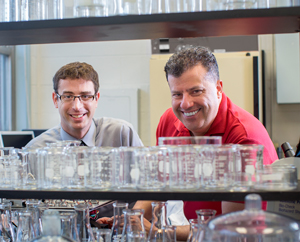The University of Tennessee Establishes Institute of Biomedical Engineering (iBME)

KNOXVILLE, Tenn.– UT has launched a new institute to research solutions to medical problems such as devices for improved delivery of medications and monitoring of patients; better imaging technology; regenerative models to help the body heal itself; and optimized efficiency in the healthcare setting. Finding answers to these and many other healthcare problems is possible through a unique collaboration introduced by the new Institute of Biomedical Engineering. This new institute connects not only engineering and medicine but also three diverse UT campuses in a collaboration that is unique in the country; innovative for UT faculty, physicians and students; and beneficial to people everywhere.
On February 1, the UT Tickle College of Engineering (TCE) and the Office of Research & Engagement in collaboration with the UT Graduate School of Medicine (GSM) and UT College of Veterinary Medicine (CVM) established a new multidisciplinary initiative: the Institute of Biomedical Engineering (iBME). While the institute is operationally based in the engineering college, it is intended to be an intellectual bridge to a number of disciplines including engineering, medicine, veterinary medicine, arts & sciences, nursing, agriculture, and others.
iBME provides a unique opportunity for UT to respond to the growing demand for education and research opportunities in the rapidly expanding field of biomedical engineering. Researchers from the three founding institutions work collaboratively with scientists, physicians, faculty, and students from many UT disciplines to research today’s medical problems, resulting in better healthcare for the state and beyond.
The goals of iBME include generating cross-disciplinary teams to develop healthcare innovations and discover new research funding; to offer a multidisciplinary curriculum and real-world medical experiences to engineering students; to provide a regional resource to improve the general public’s understanding of biomedical engineering; and to establish outreach to area educators and students to develop interest in and knowledge of the field.
“We are coming together to capitalize on resources and collaborate on medical problems that can only be solved through such teamwork,” says Mohamed Mahfouz, PhD, a professor in the TCE and director of iBME. “If we confine the field of biomedical engineering into just one department, we lose the perspective of what can be accomplished.”
Research focus areas include molecular, cellular, and tissue engineering; healthcare engineering; and imaging, biomechanics, and devices. iBME will also feature masters and PhD programs in biomedical engineering that include specialization tracks in the three research focus areas.
Mahfouz, a professor of biomedical engineering in the Department of Mechanical, Aerospace and Biomedical Engineering (MABE) and an internationally established researcher in the field of biomedical engineering, is the director of iBME. Dr. Eric T. Boder, an associate professor in the Department of Chemical Engineering, is the institute’s academic director, and serving as research and outreach director is Dr. Christopher P. Stephens, medical-engineering liaison and an assistant professor in the COE, GSM, the Center for Materials Processing, and the biomedical engineering program in MABE.
For more information, contact Kim Cowart at the Tickle College of Engineering, (865) 974-0686/kcowart@utk.edu; Amanda Johnson at the UT Graduate School of Medicine at (865) 305-9190/AFJohnso@utmck.edu; or Sandra Harbison at the UT College of Veterinary Medicine at (865) 974- 7377/sharbiso@utk.edu.